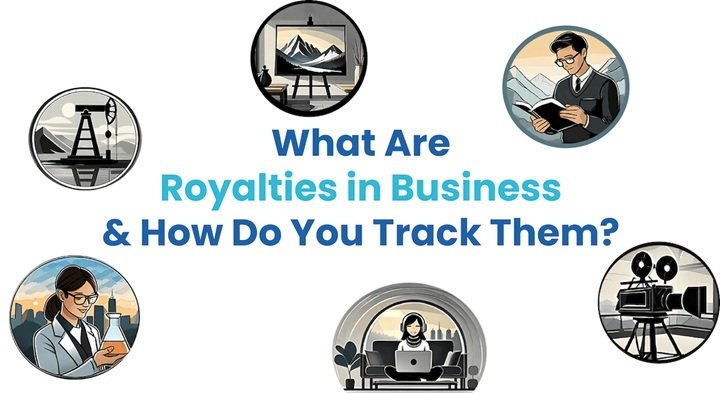In the area of change and entrepreneurship, the term “what is royalty in corporation” is often encountered, however now not fully understood. Royalties play an essential function in lots of industries, consisting of publishing, song, franchising, and era. This article objectives to offer an explanation in detail of what royalty is in a corporate setting, its types, how it works, and why it’s vital for enterprise owners and creators alike.
What is Royalty in Business?
Royalty in business corporation refers to a fee made with the resource of one party (the licensee) to some other (the licensor) for the continuing use of an asset, belongings, or intellectual property owned by the licensor. This fee is generally a percentage of sales or a set amount in line with units sold.
To locate it clearly, royalties are a form of repayment or income paid to the owner of an idea, product, or service, permitting others to use it under agreed terms.
For instance, a writer gets royalties from the sale of their books, or a franchise owner can pay royalties to the franchising enterprise for the usage of its brand and business corporation model.
Types of Royalties in Business
Understanding the types of royalties is important for greedy what royalties are in an industrial enterprise:
1. Intellectual Property Royalties
These royalties are paid for the usage of highbrow belongings alongside copyrights, patents, emblems, or trade secrets. Examples embody:
- Book royalties are paid to authors.
- Music royalties are paid to songwriters and musicians.
- Patent royalties for the usage of patented inventions.
2. Franchise Royalties
Franchise royalties are expenses paid by franchisees to the franchisor for using the brand name, trademarks, and operating systems. This often includes:
- A percentage of gross sales.
- A fixed periodic rate.
3. Mineral Royalties
These royalties arise from the extraction of natural resources such as oil, gasoline, or minerals. The landowner gets a charge for allowing extraction on their assets.
4. Software Royalties
Payments are made for licensing software utilization, typically a percentage of sales or a fixed rate.
How Does Royalty Work in Business?
To understand what royalties are in a business organization, it’s crucial to recognise how royalties feature:
- Licensing Agreement: The licensor and licensee enter into a settlement specifying the terms — how the asset can be used, duration, and royalty costs.
- Royalty Rate: This is the agreed percentage or regular amount. For example, an author might also get 10% royalties on each e-book offered.
- Payment Structure: Royalties are frequently paid periodically — month-to-month, quarterly, or yearly — based mostly on sales or gadgets provided.
- Accounting & Reporting: Licensees ought to preserve accurate statistics of income or usage to ensure accurate royalty payments.
Why Are Royalties Important in Business?
Knowing what royalties are in a commercial enterprise highlights why royalties remain:
- Monetization of Assets: Royalties permit proprietors to monetize intangible property like minds and brands without promoting them outright.
- Incentive for Innovation: Creators earn ongoing profits, motivating innovation and creativity.
- Business Expansion: Franchising with royalties permits speedy brand expansion with lower capital funding.
- Legal Protection: Royalties formalize the use of highbrow property and defend proprietors’ rights.
Examples of Royalty Agreements
Publishing Industry
Authors attain royalties on ebook income. For example, if a writer’s royalty charge is 12%, they earn 12% of the book’s retail price for every reproduction supplied.
Music Industry
Musicians and songwriters earn royalties from performances, radio performances, and digital streams.
Franchising
A McDonald’s franchisee pays a royalty charge, generally a percentage of gross profits, to the franchisor.
Factors Affecting Royalty Rates
Several factors affect the royalty price in business employer agreements:
- Industry Norms: Different industries have standard royalty tiers.
- Asset Value: Higher-cost intellectual property commands better royalties.
- Market Demand: More famous products can justify better royalty prices.
- Negotiation Power: Stronger licensors can also negotiate better expenses.
Royalty vs License Fee: What’s the Difference?
Though associated, royalties and license prices are wonderful:
- License Fee: A one-time or in advance charge to collect rights.
- Royalty: An ongoing rate based to tally mostly on use or income.
Many agreements contain each.
Advantages and Disadvantages of Royalties
Advantages
- Continuous revenue move for licensors.
- Lower initial value for licensees.
- Encourages innovation and progressive artwork.
Disadvantages
- Licensees may also additionally feel careworn with the aid of ongoing payments.
- Calculations and reporting may be complicated.
- Potential disputes over royalty amounts.
How to Calculate Royalties?
Calculating royalties is based on the agreement phrases, but typically:
Royalty Payment = Royalty Rate (%) × Gross Sales
For example, with a 5% % royalty rate on $100,000 profits, the rate = $5,000.
Tips for Managing Royalties in Business
- Maintain obvious contracts.
- Use a dependable accounting software program.
- Regularly audit royalty statements.
- Negotiate smooth phrases in advance.
Conclusion
Understanding what royalty is in enterprise is essential for all and sundry managing high-value belongings, franchising, or licensing. Royalties offer a mechanism to earn profits from belongings without losing ownership and foster an honest environment for creators and agencies to thrive.
Frequently Asked Questions (FAQ) approximately Royalty in Business
Q1: What is royalty in agency?
A: Royalty is a price paid for the continuing use of intellectual assets or belongings, normally as a percentage of income or income.
Q2: How are royalties calculated?
A: Royalties are calculated based on a percentage of gross income or a set amount in keeping with the unit offered, as certain in the licensing settlement.
Q3: Are royalties most beneficial for revolutionary works?
A: No, royalties can apply to patents, logos, natural property, franchises, and software licenses.
Q4: What is the difference between a royalty and a license charge?
A: A license rate is often a one-time rate, while royalties are ongoing payments based mostly on use or income.
Q5: Can royalty quotes be negotiated?
A: Yes, royalty charges are negotiable and depend on elements like organization requirements, asset rate, and negotiation strength.
Q6: Do all companies pay royalties?
A: No, royalties are specific to organizations using licensed property or intellectual assets.
Q7: What industries generally use royalties?
A: Publishing, track, franchising, mining, generation, and software program industries normally use royalties.
Q8: Are royalties taxable?
A: Yes, royalties are commonly taken into consideration as taxable profits, but tax remedy can vary with the aid of jurisdiction.
Q9: What is a royalty agreement?
A: It’s a legal settlement defining terms, price costs, and rights concerning the use of the licensed asset.
Q10: How often are royalties paid?
A: Royalties are generally paid periodically – month-to-month, quarterly, or yearly – depending on the settlement.










